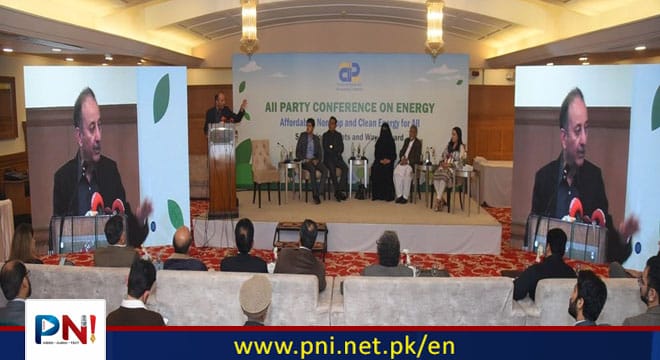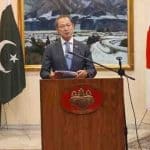ISLAMABAD, Dec 2 (APP):Former Minister of State for Petroleum, Senator Musadik Malik on Saturday said, “Pakistan’s 250 million people need energy, and the country do not have sufficient energy while utilisation of energy is also low, but its crucial to increase its GDP.
He said environment and energy production and utilisation are closely linked due to its crosscutting nature and multi sectoral impacts.
He was speaking at the Centre for Peace and Development Initiatives (CPDI) organized first ever all parties’ conference here to draw attention to the importance of high-level political commitment for urgent, synchronised, and decisive steps towards Just Energy Transition (JET) from fossil fuels to renewable sources of energy, All major political party representatives participated in the event, and in total more than hundred participants attended the meeting.
Senator Malik while representing the Pakistan Muslim League Nawaz (PML-N) said, “Due to air pollution only the rich can breathe because they can afford machines to clean air for themselves. We need to look at the complexity of the energy problem. Solar, run of the river, and wind hybrid solution can be very helpful”, he added.
“Pakistan’s dependence on fossil fuels for energy is not only a major cause of our growing import bill and the consequent balance of payment crisis but also of environmental degradation and climate change resulting in higher temperatures, more intense smog in winters and increased frequency and intensity of natural disasters like floods”, said Executive Director, CPDI, Mukhtar Ahmad Ali while inaugurating the all parties conference on energy. “This situation calls for top-level political commitment for urgent measures to reduce dependence on fossil fuels and substantially increase the share of renewable sources of energy like solar, wind, small hydro in our overall energy generation and consumption.”, he added.
“The political parties must commit to Increase the share of green and clean renewable energy in the overall energy generation installed capacity to at least 35% by 2030, devolve the power generation, transmission, and distribution in accordance with articles 157 of the constitution, and 2/3 electricity generation shifted on local energy resources”, he added.
“CPDI has keenly analyzed the 2018 election manifestos of various political parties to assess their energy-related commitments. We noted that most political parties have been putting substantial emphasis on the energy sector in the past, but they are of the view that new fresh pledges will further demonstrate the political solidarity with the state and people of Pakistan in view of the recently emerged challenges i.e. climate change, floods, high import bill, new Carbon Border Adjustment Mechanism (CBAM), growing cost for consumers, opportunities to reduced cost of energy, improve grid and transmission system, and more efficient battery solutions etc.”, said Mukhtar Ahmad Ali while laying emphasis on the need of political commitments.
A documentary produced by CPDI was played on Delta Blue project conducted in Sindh. The documentary familiarized the participants about the dynamics and implications of climate change and carbon credits.
Dr. Farid Paracha, representing Jamat-e-Islami, asked the rulers why they have being selling expensive energy to the common Pakistanis. Energy prices have robbed people of their economic well being, and it is a serious problem. “We will not get dictation from the World Bank, IMF and make our own policies in the interest of the people of Pakistan, producing cheaper energy for development”, he concluded. M. Rehan Hashmi, representing MQM Pakistan, emphasised the importance of renewable energy and showed commitment to facilitate investment in cheap, reliable, and renewable energy.
Muzzamil Aslam, representing Pakistan Tehrik-e-Insaf, suggested five-pronged strategy to rescue the energy sector from the current crisis. It included local resource development, privatisation, and reduction in circular debt. He criticised the previous governments on their failure to keep the energy prices low.
Dr. Khalid Waleed, representing SDPI, talked about energy and economic turmoil. We consume only 88.44 Mtoe which is quite insignificant as compared to India, China, and US. He built the case for the right kind of subsidies to encourage renewables and build potential for high quality growth. “There is a need to develop a charter of environment, economy, and energy in political will and political discourse”, he emphasised.
Shahida Akhtar Ali, Jamiat Ulema Islam Pakistan, argued against the presence of special interests that cause misallocation of resources and do not help the poor to come out of poverty, and rather exploits them. She expressed the need of improving governance and management in the energy sector and formulate pro-poor policies.
Palwasha Khan, representing PPP said that Pakistan Peoples Party has shown commitment to energy renewables in the past, and it will continue its legacy of facilitating pro-people development models in every sector of the economy.
In the end, Ubaidullah Chaudhary thanked the participants and political parties in showing commitment and solidarity with the cause of sustainable renewable energy.
Follow the PNI Facebook page for the latest news and updates.









